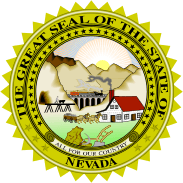Reno, NV Metropolitan Statistical Area
The Reno–Sparks Metropolitan Statistical Area, as defined by the United States Census Bureau, is an area consisting of two counties in Western Nevada, anchored by the cities of Reno and Sparks, part of Greater Reno-Tahoe-Fernley CSA. As of the 2010 census, the MSA had a population of 425,417.[1]

Communities
| Historical population | |||
|---|---|---|---|
| Census | Pop. | %± | |
| 1960 | 85,311 | — | |
| 1970 | 121,763 | 42.7% | |
| 1980 | 195,126 | 60.3% | |
| 1990 | 342,885 | 75.7% | |
| 2000 | 342,885 | 0.0% | |
| 2010 | 425,417 | 24.1% | |
| Est. 2018 | 469,764 | 10.4% | |
| U.S. Decennial Census[2] | |||
Census-designated places
Note: All census-designated places are unincorporated.
Unincorporated places
Demographics
As of the census of 2010, there were 425,417 people, 165,187 households, and 103,909 families residing within the MSA. The racial makeup of the MSA was 77.0% White, 2.3% African American, 1.7% Native American, 5.1% Asian, 0.6% Pacific Islander, 9.4% some other race, and 3.8% from two or more races. Hispanic or Latino of any race were 22.1% of the population.[3]
In 2011, the estimated median income for a household in the MSA was $50,768, and the median income for a family was $60,605. Males had a median income of $44,883 versus $35,560 for females. The per capita income for the MSA was $27,500.[4]
Combined Statistical Area
The Reno–Tahoe–Fernley Combined Statistical Area (CSA) is made up of four counties and one independent city, Carson City. The statistical area includes two metropolitan areas and two micropolitan areas. As of the 2010 Census, the CSA had a population of 579,668.[5]
Components
- Metropolitan Statistical Areas (MSAs)
- Reno (Washoe and Storey counties)
- Carson City (independent city)
- Micropolitan Statistical Areas (μSAs)
- Fernley (Lyon County)
- Gardnerville Ranchos (Douglas County)
See also
- Nevada census statistical areas
- Reno (Nevada gaming area)
References
- "Annual Estimates of the Resident Population: April 1, 2010 to July 1, 2017 – United States – Metropolitan Statistical Area; and for Puerto Rico". American FactFinder. United States Census Bureau. Archived from the original on February 13, 2020. Retrieved 2018-10-25.
- "U.S. Decennial Census". United States Census Bureau. Archived from the original on May 12, 2015. Retrieved April 12, 2020.
- "Profile of General Population and Housing Characteristics: 2010 Demographic Profile Data (DP-1): Reno-Sparks, NV Metro Area". United States Census Bureau. Retrieved January 17, 2013.
- "Selected Economic Characteristics: 2011 American Community Survey 1-Year Estimates (DP03): Reno–Sparks, NV Metro Area". United States Census Bureau. Retrieved January 17, 2013.
- "Annual Estimates of the Resident Population: April 1, 2010 to July 1, 2017 – United States – Combined Statistical Area; and for Puerto Rico". American FactFinder. United States Census Bureau. Retrieved 2018-10-25.
